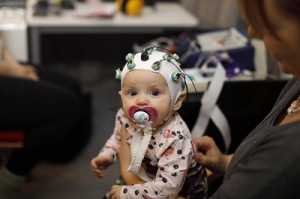13 Dec Babies’ Brain Responses Predict Dyslexic Reading Skills in School
MedicalResearch.com Interview with:
 Kaisa Lohvansuu, PhD
Kaisa Lohvansuu, PhD
Postdoctoral Researcher
Jyväskylä Centre for Interdisciplinary Brain Research
Department of Psychology
University of Jyväskylä
MedicalResearch.com: What is the background for this study?
Response: Developmental dyslexia, a specific reading disability, has a strong genetic basis: The risk of having developmental dyslexia at school age is eight times higher than usual if either of the parents has reading difficulty. It has been known that dyslexia and also family risk for dyslexia are strongly associated with a speech perception deficit, but the underlying mechanism of how the impaired speech processing leads to reading difficulties has been unclear.

Babies’ brain responses were studied in the EEG laboratory of the Department of Psychology at the University of Jyväskylä, Finland. Photograph Petteri Kivimäki.
MedicalResearch.com: What are the main findings?
Response: Our study discovered that the brain responses of infants with an inherited risk for dyslexia predict their future reading speed in secondary school, and the predictive effect of the infant’s brain response to the reading speed is mediated by the pre-school-age naming speed of familiar objects. Atypical brain activation to speech in infants with inherited risk for dyslexia impedes the development of effective connections to the mental lexicon, and thus slows the naming and reading performances.
MedicalResearch.com: What should readers take away from your report?
Response: Our results show that if search of the words from the mental lexicon is hindered before school-age reading can still be tangled in secondary school. It suggests that the evaluation of the naming speed should probably be included in the pre-school age pre-reading skills assessment batteries.
MedicalResearch.com: What recommendations do you have for future research as a result of this study?
Response: Additional longitudinal studies are needed to uncover more comprehensive understanding of the causal developmental pathways of dyslexia. Also research on how to improve naming speed would be essential to be able to develop remedial education.
MedicalResearch.com: Is there anything else you would like to add?
Response: I would like to thank the families for participating in the study. The study was supported by the Centre of Excellence program of the Academy of Finland (Grants #44858 and #213486).
MedicalResearch.com: Thank you for your contribution to the MedicalResearch.com community.
Citation:
Lohvansuu, K., Hämäläinen, J. A., Ervast, L., Lyytinen, H., & Leppänen, P. H. T. (2018). Longitudinal interactions between brain and cognitive measures on reading development from 6 months to 14 years. Neuropsychologia, 108, 6-12. https://doi.org/10.1016/j.neuropsychologia.2017.11.018
Note: Content is Not intended as medical advice. Please consult your health care provider regarding your specific medical condition and questions.
[wysija_form id=”1″]
Last Updated on December 13, 2017 by Marie Benz MD FAAD
